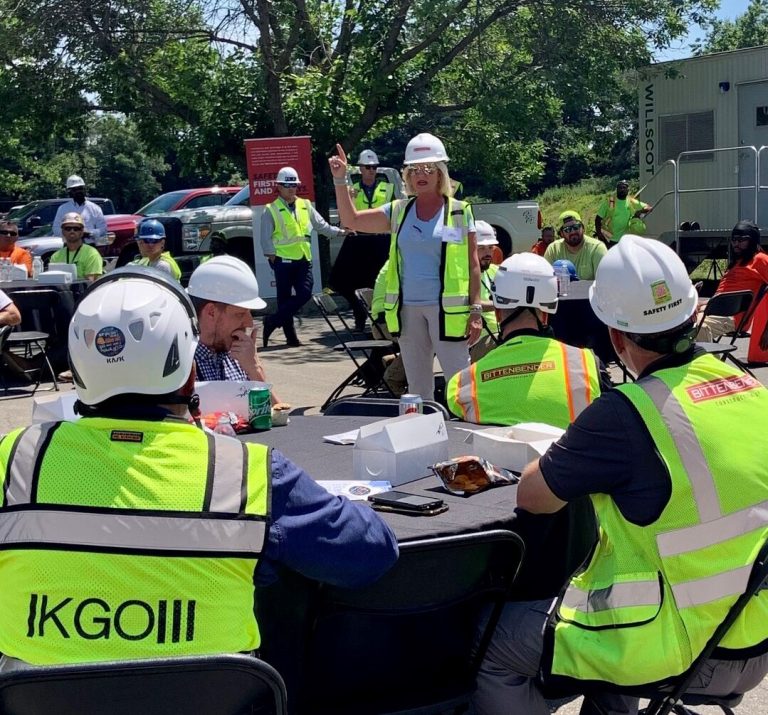Emily Bittenbender is the Owner and Managing Partner of Bittenbender Construction, a 100% woman-owned construction company based out of Philadelphia, Pennsylvania. Emily has broken barriers for women in construction, becoming the first woman to serve as chairman of the board of directors for the General Building Contractors Association (GBCA).
We spoke to Emily in honor of Women’s History Month. She shared how the industry has evolved in the past few years and offered her predictions about the future of construction. Hint: she believes many more changes are on the way – from the use of prefab construction materials to diversity in leadership. Check out our interview below.
How did you get your start in the construction industry?
Before opening my own business, I worked in commercial interior design, managed a $3.2 billion capital program for the city of Philadelphia, and served as Vice President of Design and Construction for a $137 million museum project.
One day, I was talking to a friend about the next step in my career. I told him I was going to design women’s gear for motorcycles. He looked at me and said, “That’s a stupid idea. You should start a construction company.”
That was 20 years ago. Soon after that conversation, I sold everything I owned and liquidated all my accounts to start Bittenbender Construction.
What makes Bittenbender Construction different?
When I got my start, people didn’t trust construction companies and contractors. We wanted to change that. In fact, our tagline is changing the way you think about construction. We’re committed to transparency, mentorship, and fostering diversity in the workplace.
Businesses in all industries are having conversations about diversity every day, but we’ve really made strides. Mentorship is one way we empower women and people of color to succeed in this industry.
In fact, a competitor recently asked us to mentor his daughter, so she’s prepared to take over when he retires. But first, he wants her to get a different perspective on the industry. Mentoring the next generation contributes to a more inclusive workforce and promotes innovation. When people work with us, they get a unique perspective on the industry that they won’t get anywhere else.
How has being a woman in a male-dominated industry influenced your approach to construction?
People used to ask me if I worked for my dad or my husband. What started in a basement in Philadelphia’s Old City, grew to become the only woman-owned, woman-managed, and woman-founded union commercial contractor in the region.
Today, five out of the six executives at Bittenbender Construction are women. To this day, I’ve never come across another woman-owned construction company that actually was founded and run by women.
As a woman-owned business, we take a different approach to leadership and client relationships. Many of our competitors run their companies like the military or a pirate ship. We’re more progressive and family-friendly, with a more democratic approach to operations. Team members feel valued, and they have a voice.
There used to be a lot of conflict in the construction industry, and many companies weren’t open to hiring women. The shift began when the current generation of leaders took over. Now, companies are very open to hiring women, and there’s a big push to hire brown and black businesses.
What are some of the biggest challenges impacting the construction industry?
The world is moving away from hand-built constructions. Right now, we’re still using old-school labor and materials, with everything getting built on-site.
However, things are going to change dramatically in the next 10 to 20 years. Instead, more buildings will be fabricated in factories as components, which will then be assembled on-site. In fact, we’re already seeing this with modular and prefab constructions, and I think a complete shift is on the horizon.
How would the shift to modular and prefab constructions impact clients and the community?
The positive impact in cities like my own Philadelphia would be substantial. Shifting to a prefab approach would create jobs that don’t require extensive skills or experience in the industry. Plus, workers don’t necessarily have to deal with the harshness of cold winters and hot summers to do these jobs – making them more attractive. Philadelphia has one of the largest poverty rates in the country, and jobs like this would provide a substantial boost to the local community.
Meanwhile, clients will have much more control over their projects. For example, we’re using building information modeling (BIM) to perfectly outfit ceilings. Using technology to design buildings enables us to be much more precise. The result is less waste and fewer mistakes, saving time and money for the client.

There used to be a lot of conflict in the construction industry, and many companies weren’t open to hiring women. The shift began when the current generation of leaders took over.
Emily Bittenbender,
Owner and Managing Partner of Bittenbender Construction
How are companies like Bittenbender Construction and KGO pushing the industry forward?
In the past, the teams working on construction projects looked like a triangle. There was the owner, architect, and contractor. This approach didn’t allow for true teamwork because there was always an imbalance of power.
The new approach is teaming, which means supporting everybody with the understanding that if the architect, owner, and contractor all do well, you get a better project. There may still be challenges along the way, but working with companies like KGO allows for stronger collaboration.
How does it make you feel to see the industry growing more diverse?
The General Building Contractors Association (GBCA) of Philadelphia was founded in 1724. In 2016, I became the first woman to serve as Chairman of the Board of Directors. That organization represents the industry. To see it embracing women and people of color in leadership shows that the industry is evolving.
My business partner, Angela Vacante, and I have always said to each other that we wanted the industry to look different when we retire. In the past, most business owners expected to pass the reigns over to their sons. After watching me at the GBCA board table and seeing the success of my business over the last 20 years, my competitors say they see us as a model for women in construction. They’re looking at their daughters a lot differently these days.
Build a great team for your next project
Right now, KGO and Bittenbender Construction are working together on a mission critical site, meaning collaboration and communication is essential. Our project management team helps clients navigate complex projects with ease. We’ll help you assemble a team of subject-matter experts to bring your project to life.


